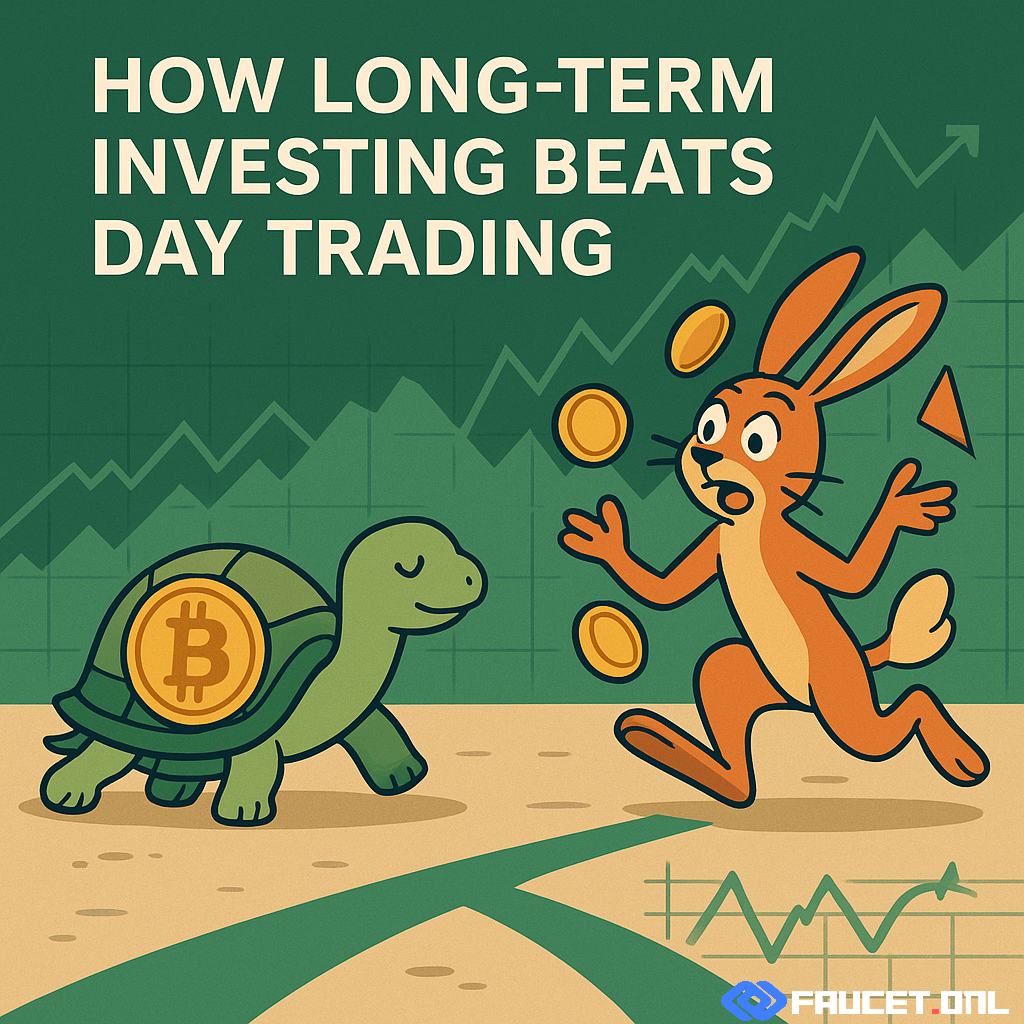Long-Term Investing vs. Day Trading: A Clear Comparison
The crypto world attracts two distinct types of investors: long-term holders (“HODLers”) and day traders. Day trading involves frequent buying and selling—sometimes dozens of trades per day—trying to profit from short-term price swings. In contrast, long-term investing is about buying quality assets and holding them for months or years, letting value appreciate over time.
While day trading can look glamorous on social media, research from both traditional and crypto markets shows that most day traders underperform the market, often losing money after fees and taxes. Long-term investors, on the other hand, are better positioned to benefit from overall market growth, compound returns, and lower transaction costs.
Why Long-Term Investing Wins
There are compelling reasons why long-term investing consistently beats day trading for the majority of participants:
- Compounding Returns: Long-term investors benefit from compounding gains—profits that generate more profits as they are reinvested over time.
- Reduced Stress and Time Commitment: Holding assets long term requires less daily monitoring and decision-making, leading to less anxiety and burnout.
- Lower Transaction Costs: Day trading racks up fees on every trade, eating into profits. Long-term holders pay less in fees and slippage.
- Favorable Tax Treatment: Many jurisdictions offer lower tax rates on assets held for more than a year, boosting after-tax returns.
- Resilience to Market Volatility: Short-term price swings are less relevant to long-term outcomes. Investors who hold can ride out dips without panic selling.
- Statistical Edge: Studies show that only a small percentage of day traders consistently beat the market, while a diversified long-term portfolio has a much higher success rate.
How to Start a Long-Term Investing Strategy
Building a successful long-term crypto portfolio starts with a few core steps:
- Research Quality Projects: Focus on assets with strong fundamentals, use cases, development teams, and active communities.
- Diversify: Don’t put all your funds into one token. Spread investments across sectors, chains, and risk profiles.
- Set a Clear Plan: Define your investment horizon, goals, and rules for buying more or taking profits.
- Automate Investments: Use dollar-cost averaging (DCA) to buy at regular intervals, reducing the impact of volatility.
- Secure Your Assets: Store your holdings safely, preferably in cold wallets, and regularly back up keys.
- Monitor Progress: Check in periodically to rebalance and ensure projects still align with your strategy—but avoid knee-jerk reactions to news or price swings.
Risks and Challenges of Long-Term Investing
No strategy is without risks. Long-term investors face:
- Market Downturns: Extended bear markets can test patience and conviction.
- Regulatory Changes: New laws or tax rules can impact specific assets or your overall portfolio.
- Project Failures: Even promising projects can falter or disappear; diversification is your safety net.
- Security Risks: Wallet hacks or loss of access can permanently erase holdings if not properly managed.
Tips for Outperforming as a Long-Term Investor
- Stay Informed, Not Reactive: Follow market developments, but avoid emotional decisions based on daily price action.
- Review and Rebalance: Adjust allocations periodically to stay aligned with your risk profile and goals.
- Embrace Boring: Boring, steady accumulation often beats chasing the latest hype or trend.
- Avoid Overtrading: Resist the urge to sell winners too early or chase losses during corrections.
- Celebrate Small Wins: Recognize progress and compound growth rather than seeking instant gratification.
Conclusion
Day trading can be exciting, but the odds are stacked against most short-term speculators. By embracing a long-term mindset—focusing on quality, diversification, and the power of compounding—you set yourself up for greater resilience, less stress, and potentially higher returns. In crypto as in traditional markets, the patient investor usually comes out ahead.



